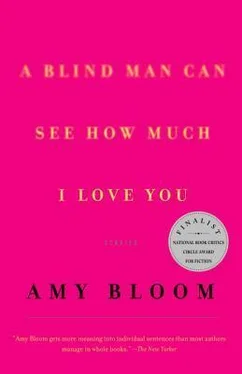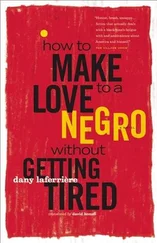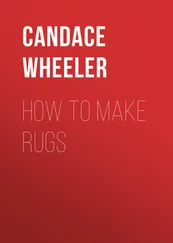Amy Bloom
A Blind Man Can See How Much I Love You
A Blind Man Can See How Much I Love You
Jane Spencer collects pictures of slim young men. In the bottom drawer of her desk, between swatches of silk and old business cards for Spencer Interiors, she has two photos of James Dean, one of a deeply wistful Jeremy Irons in Brideshead, arm in arm with the boy holding the teddy bear, a sepia print of Rudolph Valentino in 1923, without burnoose or eyeliner, B. D. Wong’s glossies as Song Liling and as his own lithe, androgynous self, and Robert Mapplethorpe slipping sweetly out of his jeans in 1972. She has a pictorial history of Kevin Bacon, master of the transition from elfin boy to good-looking man without adding bulk or facial hair.
The summer Jessie Spencer turned five, she played Capture the Flag every day with the big boys, the almost-six-year-olds who’d gone to kindergarten a year late. Jane never worried, even in passing, about Jessie’s IQ or her eye-hand coordination or her social skills. Jessie and Jane were a mutual admiration society of two smart, strong, blue-eyed women, one five and one thirty-five, both good skaters and good singers and good storytellers. Jane didn’t mention all this to the other mothers at play group, who would have said it was the same between them and their daughters when Jane could see it was not, and she didn’t mention it to her own sweet, anxious mother, who would have taken it, understandably, as a reproach. Jane didn’t even mention this closeness to the pediatrician, keeper of every mother’s secret fears and wishes, but it sang her to sleep at night. Jane’s reputation as the play group’s good listener was undeserved; the mothers talked about their knock-kneed girls and backward boys and Jane smiled and her eyes followed Jessie. She watched her and thought, That smile! Those lashes! How brave! How determined!
Jane sometimes worried that Jessie was too much of a tomboy, like Sarah and Mellie, even faster runners and more brutal partisans; it was nothing to them to make a smaller boy cry by yanking up his underpants, or to grind sand into the scalp of the girl who hogged the tire swing. These two didn’t cry, not even when Mellie cut her lip on the edge of the teeter-totter, not even when Sarah got a splinter the size of a matchstick. But Sarah and Mellie, in their overalls and dirty baseball jerseys, never had the boys’ heartless prankishness, the little devils dancing in the blacks of their eyes. Jessie had exactly that, and the other kids knew she wasn’t a tomboy, never strained to be one of the boys. There was no teasing, no bullying line drawn in the sand. Jane knew that one day soon, in the cove behind John Lyman School, the boys would pull out their penises and demonstrate to Jessie that she could not pee standing up, and it would be terrible for Jessie. Jane was wrong. Jessie watched the boys and practiced at home, making a funnel with both hands and a baggie. When Andrew and Franklin went to pee on the far side of the rhododendron, Jessie came too, unzipping and pushing her hips forward until there was, if not a fine spray, a decent dribble. The boys thought nothing of it until first grade, and when they did and the teacher pushed Jessie firmly into the girls’ bathroom, she walked home at recess, horrified by the life ahead, and Jane could not coax her back for a week.
It was worse when Jane took her to get a simple navy blue jumper for a friend’s wedding. Jane held it out, pleased that she’d found something in Jessie’s favorite color without a ruffle or a speck of lace, and Jessie stared at it as if her mother had gone mad, wailing in rage and embarrassment until Jane drove her to Macy’s for a boy’s navy blazer with gray pants and dared the salesperson to comment. They compromised on patent leather loafers and a white turtleneck. People at the wedding thought only that Jane was her fashionable self and Jessie adorable. Very Kristy McNichol, the bride’s mother said. Driving home, Jane knew that she had managed not to see it, as you manage not to see that your neighbor’s new baby has your husband’s eyes and nose, until one day you run into them at the supermarket and you cannot help but see. Jessie slept the whole way home, smears of buttercream on the white turtleneck, rose petals falling from her blazer pocket, and Jane cried from Storrs to Durham. She had appreciated and pitied her mother and adored her father, a short, dapper man who cartwheeled through the living room at her request and told his own Brooklyn version of Grimm’s Fairy Tales at bedtime. She had liked Jessie’s handsome father enough to think of marrying him until he was revealed to have a wife in Eau Claire and bad debts in five states. It did not seem possible that the great joke God would play on her was to take the love of her life, a wonderfully improved piece of Jane, and say, Oops. Looks like a girl but it’s a boy! Sorry. Adjust accordingly. It took Jane all of Jessie’s childhood to figure out what the adjustment might be and to save fifty thousand dollars to pay for it.
How do you get the first morning appointment with the best gender-reassignment surgeon in the world? It cannot be so different from shopping at Bergdorf’s, Jane thinks. She looks twice at the pretty brown-skinned receptionist behind the big pine desk. The woman’s shoulders are enormous; the fabric of her teal jacket pulls hard across her back, and when she reaches for Jess’s file, the seams of her straight skirt crack and bend over her powerful thighs. Jane doesn’t want to be distracted by thinking about this person’s femaleness, genetic or otherwise. Jane’s job is to be pleasant and patient as a gesture of respect, to be witty, if possible, and to convey, without any vulgar emphasis, that she is the kind of woman who really, really appreciates good service.
“Lovely flowers,” Jane says. “The white alstroemeria. What do they call them? Peruvian lilies, I think.” Jane knows what most flowers are called.
Marcella Gray puts her hands together like a bishop, clicking her long red nails. She knows what Jane is thinking. Her own daughter calls her the Deltoid Queen. Her husband calls her Queen Lats. Marcella loves bodybuilding and Dr. Laurence, and when he added transsexuals to his practice she didn’t love it, but she learned to live with it and the little irony that came with being their receptionist. Jane Spencer is a well-bred pain in the ass, but the boy looks like he will make it. Tall enough, small hips.
Jess hears Jane charming across the room and looks up from Newsweek, smiling at Marcella and running a hand through his black hair. It is a killer smile, white teeth and a dimple near his blue eyes. Marcella smiles back, which is more than she usually does. Jess doesn’t think that Jane can get them a better appointment, but it’s not impossible. Jane got the registrar at Reed to accept that Jess Spencer who begins there next January is a boy, even though Jessie Spencer finished her freshman year at University of Michigan as a girl. It had been Jane’s thought that the anonymity of big Michigan would not be a bad idea. Substance abuse and black-market hormones and botched surgeries are the tragedies of transsexuals, but Jess suspected that pure loneliness would do him in. He had not gone out for a beer with a pal or kissed a girl since he started cross-dressing in earnest. He wouldn’t go out with his transitioning self, and he didn’t want the kind of person, boy or girl, who would.
Once you know there are transsexuals, you see them everywhere. Short, pear-shaped men. Tall, knobby women. When you walk out of the waiting room of the North American Gender Identity Clinic, everyone looks peculiar. You flip through magazines and think, Hmmm, Leo DiCaprio? There’s something about him. And Jamie Lee Curtis? Look at those legs.
Читать дальше












